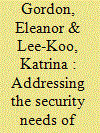|
|
|
Sort Order |
|
|
|
Items / Page
|
|
|
|
|
|
|
| Srl | Item |
| 1 |
ID:
177752


|
|
|
|
|
| Summary/Abstract |
Adolescent girls face significant and often unique forms of insecurity in protracted crises. Yet, their specific needs tend to be overlooked by international agencies, and they are rarely consulted as programs are developed and implemented. Drawing from field research conducted in four crisis contexts—Lake Chad (Niger, Nigeria, and Cameroon), South Sudan and Uganda, Lebanon (Beirut), and Bangladesh (Cox’s Bazar)—this article explores the experiences of insecurity that adolescent girls face in crisis contexts, and the extent to which responses to their needs are inclusive, responsive, and effective. Employing literature from inclusive peacebuilding, the article argues that marginalizing adolescent girls in the development and implementation of programs compromises the ability for such programs to be responsive to their needs. Moreover, it misses the opportunity to employ their skills, knowledge, and strengths to build resilience and security within their communities.
|
|
|
|
|
|
|
|
|
|
|
|
|
|
|
|
| 2 |
ID:
181130


|
|
|
|
|
| Summary/Abstract |
Until it was destroyed in a fire in September 2020, Moria camp on the island of Lesvos, Greece, was widely referred to as ‘a living hell’. This article investigates the causes and effects of poor camp conditions from the perspectives of humanitarian actors who have worked in the camp. We argue that poor conditions are intended to perform a deterrent function for both migrants and humanitarian actors. We also argue, however, that such camps are not simply static manifestations of violent borderwork, but complex, dynamic sites of struggle in which those who live and work there continuously make and remake the camp. This can be seen, for instance, in the ways in which humanitarian actors simultaneously fill the gap resulting from the violent inaction of the state while contributing to poor camp conditions, as a result of inter-agency competition and criticism, and the broader ways in which they challenge and reinforce the violent governance of migration.
|
|
|
|
|
|
|
|
|
|
|
|
|
|
|
|
|
|
|
|
|